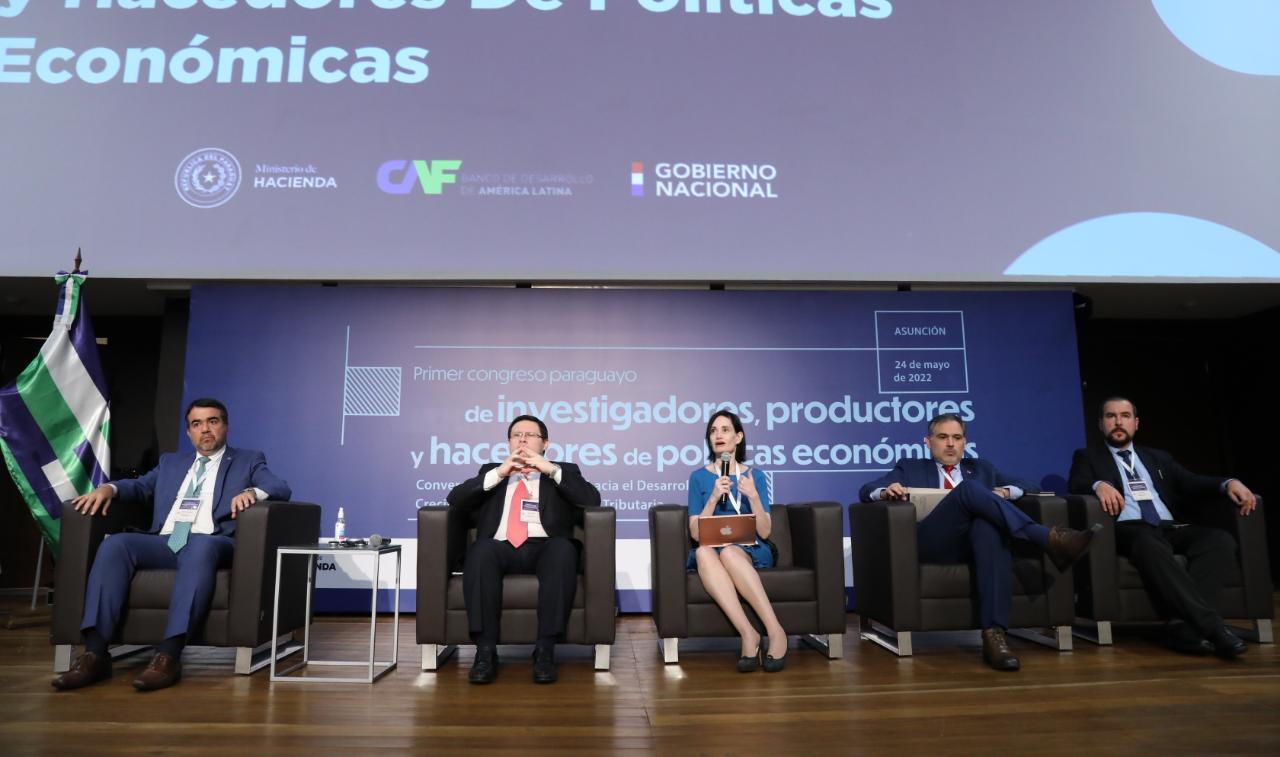RIO DE JANEIRO, BRAZIL – Renowned speakers, both local and international, exchanged positions and experiences at the First Paraguayan Congress of Researchers, Producers, and Makers of Economic Policies, which addressed the keys to an inclusive economic recovery of Paraguay after the effects of the pandemic.
This event was organized by the Ministry of Finance, with support from CAF-Development Bank of Latin America, and took place at the headquarters of the Institute of the Central Bank of Paraguay (BCP).
The international congress consisted of six panels that included various topics such as fiscal policy, economic growth, monetary policy, industrial production, post-pandemic challenge, and tax pressure.

The 2019 Nobel Prize in Economics winner, Michael Kremer, gave a keynote speech on development and inclusion. He said that randomized controlled trials could help improve economic development with social inclusion because it allows knowing which elements of the policy work and which do not.
During the first panel on fiscal policy, Tim Kehoe, from the University of Minnesota (USA), commented that Paraguay is a good example of how anti-inflationary policies do not necessarily have to be contractionary and can stimulate growth. He also considered that it is one of the best countries in Latin America in fiscal matters and should be at the world level.
During the second panel on economic growth, the Minister of Agriculture, Santiago Bertoni, said that Paraguay, with 7 million inhabitants, produces food for 11 times its population. Humberto Colmán, a member of the Board of Directors of the BCP, indicated that total factor productivity had been reduced in the last seven years.
In turn, Santiago Levy, a researcher at the Global Economy and Development Program of Brookings (USA), considered that the failed states of social welfare must be redesigned to promote inclusive growth.
While a member of the Board of Directors of Development in Democracy (Dende) and former Minister of Finance, César Barreto, mentioned that transfer policies must be well designed to be successful.
In another moment, in the third panel where monetary policy was analyzed, the president of the BCP, José Cantero, expressed the need for social consensus building and accelerated diversification with new growth engines for the country.
Meanwhile, the dean of the Faculty of Economics and Business of the University of Chile, José De Gregorio, said that it is not good to use reserves to lower the exchange rate to control inflation.
Subsequently, industrial production was the topic addressed in the fourth panel, in which the dean of the Faculty of Economics of the Universidad de los Andes of Colombia, Marcela Eslava, said that the greater inequality in our countries reflects very low income levels of a vast mass of the population.
The Paraguayan Industrial Union (UIP) president, Enrique Duarte, said that public procurement should be a mechanism for industrial development. Héctor Cristaldo, head of the Unión de Gremios de la Producción (UGP), pointed out that Paraguay has the third-largest barge fleet in the world, behind China and the United States.
Then, in the fifth panel on the post-pandemic challenge, the former Finance Minister of Chile, Felipe Larraín, considered that the recovery must be green and inclusive.
From the Chicago Booth School (USA), Chang-Tai Hsieh argued that Paraguay’s growth in recent years was fading and considered that the drivers of new high growth should be observed.
In addition, the Vice Minister of Economy, Iván Haas, indicated that the challenge for our country is to maintain and strengthen the improvement in equipment and health personnel brought about by the covid-19 pandemic.
Finally, the topic analyzed focused on tax pressure in the sixth panel. In this line, CAF’s Knowledge Manager, Adriana Arreaza, affirmed that the production of public services is crucial for development.
While the Vice Minister of Taxation, Oscar Orué, highlighted that the implementation of the Tax Reform made possible tax equity and justice, competitiveness and formalization, support for middle-income families, support for public health and tax simplification and modernization.
With information from Agencia IP

